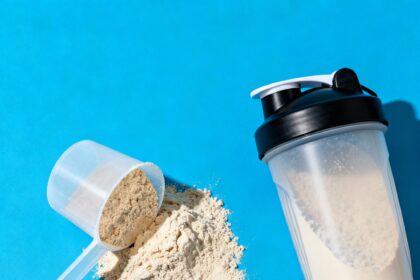By McKenna Kitterman
Introduction
Pre-workout supplements designed to enhance athletic performance have become increasingly popular among athletes, trainers, gym-goers, and bodybuilders. The supplement market is flooded with these products whose manufacturers claim help athletes run faster, push further, lift heavier, and fatigue later. But because these supplements are not as heavily regulated by the United Stated Food and Drug Administration (FDA) as traditional pharmaceutical supplements, many critics are questioning the safety and validity of the claims advertised by the pre-workout companies.
Dietary supplements are not as scrutinized by the FDA to undergo the rigorous testing of other medicines because they are not classified as drugs. They are classified under the umbrella of the “special food category” by the FDA. This is not to say that dietary supplements on the market are unsafe and ineffective. In fact, many of them are quite the opposite.
However, it is the responsibility of the buyer to research the quality and ingredients of these products and not blindly accept the claims of the manufacturer.

Key Ingredients and Their Functions
To understand if a pre-workout supplement is of good quality, the foreign words of the ingredients list must be studied and dissected. Most pre-workouts contain a proprietary blend of ingredients including caffeine, creatine, L-arginine, beta alanine, and B-vitamins. Caffeine is almost always the main ingredient in pre-workout. The dosage is typically between 100-300mg per serving which equates to about two cups of coffee.
Caffeine is known to decrease fatigue, promote wakefulness, and increase metabolic rate. It also stimulates the central nervous system to enhance brain function for a more productive and efficient workout. Creatine is a natural occurring chemical in muscle tissues. It is synthesized from amino acids that enables fast-twitch muscle fibers to perform quick and powerful movements such as sprinting or powerlifting. According to the Journal of the International Society of Sports Nutrition, the supplementation of creatine has been shown to be effective in promoting muscle growth, strength, and performance, during High-Intensity Interval Training (HIIT) workouts.
Creatine is also one of the most tested substances in the supplement industry, with a substantially impressive safety profile. L-arginine is a branch-chained amino acid. It is essential for the synthesis of protein and nitric oxide, which relaxes the blood vessels for increased blood flow and oxygen delivery. Although this supplement has been researched for its’ benefits for medical uses, more research must be completed to evaluate its effectiveness to benefit athletic performance.
Beta alanine is another naturally occurring amino acid in the body that promotes nerve signal function. Studies have suggested that supplementation of this amino acid may delay the onset of muscular fatigue and aid in increasing muscular endurance. However, beta-alanine can also overstimulate the nerve cells, causing a tingling sensation known as paresthesia.
This side effect is relatively common in people who take supplements with a high dosage of beta-alanine. Some athletes are not bothered by this sensation, while others may opt for another pre-workout supplement containing little to no beta-alanine. B-vitamins, including niacin, B-6, and B-12 all have similar roles in supporting energy metabolism and overall alertness.
Potential Side Effects
The side effects of taking pre-workout supplements are mainly attributable to the caffeine content. In high doses, the supplements may cause rapid heartrate (tachycardia), and anxiety. It may also result in high blood pressure, especially if the athlete is predisposed with conditions such as hypertension, pre-diabetes, or other heart arrythmias.
The biggest side effect of pre-workout is sleep impairment because of the caffeine levels taken at various times throughout the day. A pre-workout user who trains later in the afternoon or evening is essentially consuming the caffeine contained in two cups of coffee a few hours before they are expected to go to sleep. This will most likely impact their wakefulness and sleep schedule.

Physiological Impact on Muscle Performance
Once the common ingredients are explained and understood, the physiological impacts of these ingredients are easier to understand. Specifically, creatine and beta-alanine, as well as citrulline, and carnitine, all exert physical effects on muscle fibers. These ingredients decrease muscle damage and lactic acid build up, which is thought to be responsible for muscle fatigue. They also increase nutrient storage within the cells and increase glycogen resynthesis.
Glycogen is an important fuel source during exercise and can be replenished through the ingestion of carbohydrates. Glycogen is broken down and used as energy for muscle contraction. Maximizing this molecule can delay fatigue and improve athletic performance, leading to a better workout and stronger muscles.
Creatine’s primary function in high-intensity exercise is to increase the stores of phosphocreatine in the muscles. Phosphocreatine can then be utilized to promote ATP production, the key energy source for heavy lifting and high-intensity training.
Psychological Benefits and Mental Performance
Not only are the physical effects of pre-workout supplements necessary to understand, but the psychological effects of pre-workout are also incredibly important. As previously mentioned, caffeine is the main ingredient in most pre-workout supplements. Caffeine has many physical effects on the body, but it also has psychological effects that are equally as important to athletic performance. Motivation is an essential part of any program, and a lack of motivation can have serious negative impacts on progress.
Caffeine can help motivate someone to exercise, especially when feeling drowsy. Caffeine can decrease subjective sensations of fatigue. Elevated energy levels due to caffeine intake can drive a person to have more excitement and anticipation towards a workout, which may lead to greater results in the gym. Coupled with this, caffeine also increases the density of receptors for serotonin, GABA, and acetylcholine. Serotonin is responsible for balancing mood and for feelings of happiness and well-being.
GABA produces a calming effect, easing anxiety, stress, and fear. Finally, acetylcholine plays a role in motivation, attention, learning, memory and promoting the REM sleep cycle. Exercise on its own causes the release of chemical endorphins in the brain that trigger a positive feeling in the body, similar to the effects of morphine.
Adding the psychological effects of caffeine to the feelings that follow the release of endorphins post-workout gives way to a blissful feeling of contentment. Caffeine is also associated with reducing stress, warding off feelings of anxiety and depression, boosting self-esteem, and improving sleep.
Conclusion: Are Pre-Workouts Worth It?
So, are pre-workout supplements worth incorporating into a person’s routine? The short answer is yes. The caffeine contained in these supplements provides a boost of energy that has positive effects on focus and the overall quality of a workout. While a caffeinated beverage may have similar effects, the powdered supplements allow for more precise dosages to adjust to an individual’s specific needs.
Like any supplement, the opinion of a medical professional should be sought out before incorporating anything into routine. It has been evidenced that pre-workout supplements are helpful for tired or unmotivated individuals to get the best out of a workout. But again, research the quality of a product and its ingredients before putting it into practice.
References
Bourassa, L. (2019, October 2). Why You Need Carbs to Build Muscle. InBody USA. https://inbodyusa.com/blogs/inbodyblog/why-you-need-carbs-to-build-muscle/
Kreider, R. B. (2017, June 13). International Society of Sports Nutrition position stand: safety and efficacy of creatine supplementation in exercise, sport, and medicine. Journal of the International Society of Sports Nutrition. https://jissn.biomedcentral.com/articles/10.1186/s12970-017-0173-z
Leal, D. (2020, July 13). Do Pre-Workout Supplements Improve Your Strength and Performance? Verywell Fit. https://www.verywellfit.com/can-a-pre-workout-product-improve-physical-fitness-4154378
Mawer, R. M. (2018, October 25). Creatine 101 — What Is It and What Does It Do? Healthline. https://www.healthline.com/nutrition/what-is-creatine#how-it-works
Path, T. (2020, October 25). The Pros and Cons of Pre-Workout Supplements. The Path. http://www.thepathmag.com/the-pros-and-cons-of-pre-workout-supplements/
Trexler, E. T. (2015, July 15). International society of sports nutrition position stand: Beta-Alanine. Journal of the International Society of Sports Nutrition. https://jissn.biomedcentral.com/articles/10.1186/s12970-015-0090-y







































